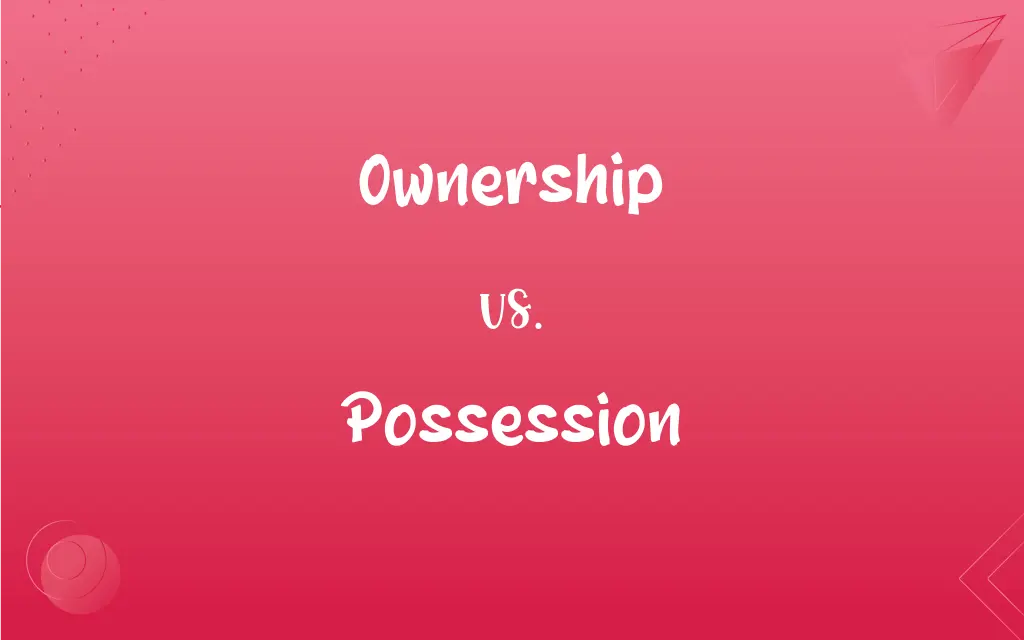Ownership vs. Possession: What's the Difference?
Edited by Janet White || By Harlon Moss || Updated on October 14, 2023
Ownership implies a legal right to an object, while possession refers to having physical control over an object, without necessarily having legal rights to it.

Key Differences
Ownership emphasizes the legal right and title to an asset or property. It signifies an individual's lawful claim to hold, use, and dispose of the item as they see fit. Possession, on the other hand, simply implies having or holding something in one's control. One might possess an item without owning it, as when renting a car.
Ownership embodies a permanent claim, reflected in a deed or title, signifying that a particular asset belongs to a person or entity. In stark contrast, possession can be temporary and may not be intertwined with legal claims. A person may possess something – like a borrowed book – without owning it.
Ownership often includes rights that are recognized and protected by a governing legal authority. It legally empowers the owner to take various actions concerning the asset, such as selling or leasing it. Possession does not automatically grant these rights; a possessor may not have the authority to sell or lease the item they have.
Ownership is generally transferable, meaning the owner can pass on their legal rights to someone else, usually through sale or inheritance. Possession, conversely, does not ensure such transferability. While you might lend an item you possess to others, this does not transfer any ownership rights.
Ownership inherently implies the right to exclude others from utilizing the asset, secured by legal mechanisms. On the flip side, possession might not enable the possessor to exclude others legally. For instance, finding a lost item might give you possession, but not ownership, which remains with the original owner.
ADVERTISEMENT
Comparison Chart
Legal Rights
Entails legal rights and authorities.
Does not necessarily include legal rights.
Duration
Typically permanent unless transferred.
Can be temporary or transient.
Transferability
Can generally be transferred to others.
Does not convey transferable rights.
Authority to Sell or Lease
Owners have the right to sell or lease.
Possessors might not have selling or leasing rights.
Exclusivity
Ensures the right to exclude others.
May not provide the right to exclude others.
ADVERTISEMENT
Ownership and Possession Definitions
Ownership
The state of having legal rights to something.
The car’s ownership was transferred to John after the payment.
Possession
In legal terms, possession is the occupation or control of an object or property, with the right to own or use it.
Her possession of the stolen jewelry resulted in her arrest.
Ownership
Having a lawful claim and authority over an asset or property.
The ownership of the artwork has been disputed for decades.
Possession
Possession refers to the state of having or owning something.
The possession of a valid passport is necessary for international travel.
Ownership
The rightful entitlement and authority to possess, use, and dispose of something.
His ownership of the software patent enables him to license it to others.
Possession
Possession can indicate a territory or domain within the dominion of a sovereign entity or state.
Puerto Rico is a possession of the United States.
Ownership
The act of having control and rights over an asset or property.
His ownership of the estate allowed him to transform it into a hotel.
Possession
In sports, possession pertains to control of the ball or puck by a player or team.
Maintaining possession of the ball is crucial for executing strategic plays in soccer.
Ownership
The condition of holding, controlling, and being able to dispose of an item.
The company changed hands, but the ownership remained within the family.
Possession
In a spiritual or supernatural context, possession denotes being controlled by an external force or entity.
The horror movie depicted a young girl under demonic possession.
Ownership
The state or fact of being an owner.
Possession
The act or fact of possessing.
Ownership
A group that owns something
The ownership of the team wants to make a trade for a better pitcher.
Possession
The state of being possessed
The land's possession by the town.
FAQs
Is ownership always permanent?
No, ownership can be transferred, sold, or relinquished, making it impermanent.
Can a person have possession of an item without owning it?
Yes, for instance, a tenant possesses the rented property but does not own it.
Can ownership and possession be separated?
Yes, one can possess something without owning it, such as renting a car, and one can own something without possessing it, like owning stock in a company.
What is possession?
Possession refers to the physical control or occupancy of an object, regardless of ownership.
Does possession always imply legal right to an item?
No, possession does not always correlate with legal rights, such as in instances of theft.
What documents typically prove ownership?
Documents like titles, deeds, or bills of sale often provide legal proof of ownership.
Can ownership be disputed?
Yes, ownership disputes may arise due to conflicting claims or inadequate proof of ownership.
How does one transfer ownership?
Ownership can be transferred through various methods such as sale, gift, or inheritance, typically involving legal documentation.
What legal rights does ownership provide?
Ownership typically provides the rights to use, lease, sell, modify, or destroy an asset.
Can ownership be shared?
Yes, ownership can be joint or collective among multiple parties, like in partnerships or joint ventures.
Does possession ensure ownership?
Not necessarily, as possession and ownership can exist independently of each other.
How does possession relate to borrowing?
Borrowing involves temporary possession without transferring ownership.
What is adverse possession?
Adverse possession involves occupying a property without the owner's permission, sometimes leading to ownership under specific legal conditions.
Can ownership be voluntary relinquished?
Yes, ownership can be willingly given up or transferred to others.
How can disputes over possession be resolved?
Disputes over possession may be resolved through negotiation, mediation, or legal action.
What is ownership?
Ownership refers to the legal right to possess, use, and dispose of assets like property, goods, or intellectual property.
Can possession be temporary?
Absolutely, possession can be momentary or for a defined period, like borrowing or renting.
Is leasing a form of temporary ownership?
No, leasing involves temporary possession and use without transferring ownership.
What happens to ownership after death?
Post-death, ownership is often transferred as per a will or statutory inheritance laws.
Can someone possess digital assets?
Yes, digital assets, like cryptocurrencies or digital files, can be possessed and owned.
About Author
Written by
Harlon MossHarlon is a seasoned quality moderator and accomplished content writer for Difference Wiki. An alumnus of the prestigious University of California, he earned his degree in Computer Science. Leveraging his academic background, Harlon brings a meticulous and informed perspective to his work, ensuring content accuracy and excellence.
Edited by
Janet WhiteJanet White has been an esteemed writer and blogger for Difference Wiki. Holding a Master's degree in Science and Medical Journalism from the prestigious Boston University, she has consistently demonstrated her expertise and passion for her field. When she's not immersed in her work, Janet relishes her time exercising, delving into a good book, and cherishing moments with friends and family.
































































